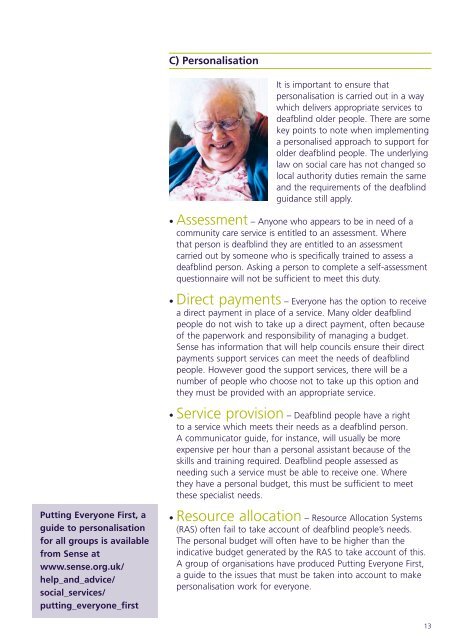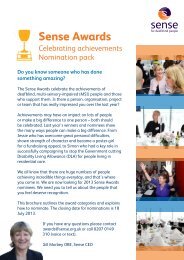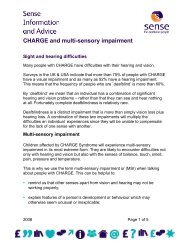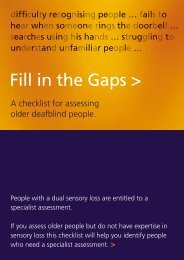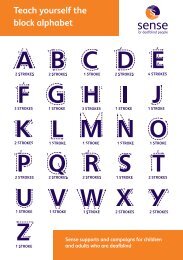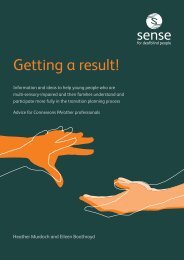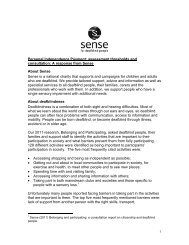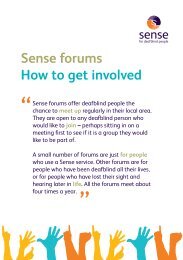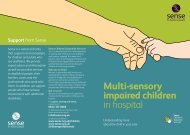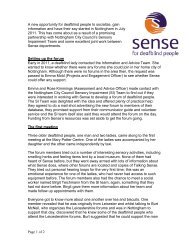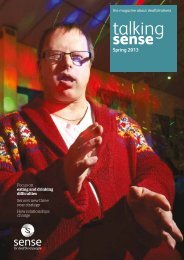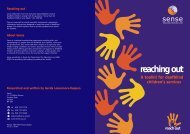Fill in the Gaps > Too many older people who are deafblind ... - Sense
Fill in the Gaps > Too many older people who are deafblind ... - Sense
Fill in the Gaps > Too many older people who are deafblind ... - Sense
You also want an ePaper? Increase the reach of your titles
YUMPU automatically turns print PDFs into web optimized ePapers that Google loves.
C) PersonalisationIt is important to ensure thatpersonalisation is carried out <strong>in</strong> a waywhich delivers appropriate services todeafbl<strong>in</strong>d <strong>older</strong> <strong>people</strong>. There <strong>are</strong> somekey po<strong>in</strong>ts to note when implement<strong>in</strong>ga personalised approach to support for<strong>older</strong> deafbl<strong>in</strong>d <strong>people</strong>. The underly<strong>in</strong>glaw on social c<strong>are</strong> has not changed solocal authority duties rema<strong>in</strong> <strong>the</strong> sameand <strong>the</strong> requirements of <strong>the</strong> deafbl<strong>in</strong>dguidance still apply.• Assessment – Anyone <strong>who</strong> appears to be <strong>in</strong> need of acommunity c<strong>are</strong> service is entitled to an assessment. Wherethat person is deafbl<strong>in</strong>d <strong>the</strong>y <strong>are</strong> entitled to an assessmentcarried out by someone <strong>who</strong> is specifically tra<strong>in</strong>ed to assess adeafbl<strong>in</strong>d person. Ask<strong>in</strong>g a person to complete a self-assessmentquestionnaire will not be sufficient to meet this duty.• Direct payments – Everyone has <strong>the</strong> option to receivea direct payment <strong>in</strong> place of a service. Many <strong>older</strong> deafbl<strong>in</strong>d<strong>people</strong> do not wish to take up a direct payment, often becauseof <strong>the</strong> paperwork and responsibility of manag<strong>in</strong>g a budget.<strong>Sense</strong> has <strong>in</strong>formation that will help councils ensure <strong>the</strong>ir directpayments support services can meet <strong>the</strong> needs of deafbl<strong>in</strong>d<strong>people</strong>. However good <strong>the</strong> support services, <strong>the</strong>re will be anumber of <strong>people</strong> <strong>who</strong> choose not to take up this option and<strong>the</strong>y must be provided with an appropriate service.• Service provision – Deafbl<strong>in</strong>d <strong>people</strong> have a rightto a service which meets <strong>the</strong>ir needs as a deafbl<strong>in</strong>d person.A communicator guide, for <strong>in</strong>stance, will usually be moreexpensive per hour than a personal assistant because of <strong>the</strong>skills and tra<strong>in</strong><strong>in</strong>g required. Deafbl<strong>in</strong>d <strong>people</strong> assessed asneed<strong>in</strong>g such a service must be able to receive one. Where<strong>the</strong>y have a personal budget, this must be sufficient to meet<strong>the</strong>se specialist needs.Putt<strong>in</strong>g Everyone First, aguide to personalisationfor all groups is availablefrom <strong>Sense</strong> atwww.sense.org.uk/help_and_advice/social_services/putt<strong>in</strong>g_everyone_first• Resource allocation – Resource Allocation Systems(RAS) often fail to take account of deafbl<strong>in</strong>d <strong>people</strong>’s needs.The personal budget will often have to be higher than <strong>the</strong><strong>in</strong>dicative budget generated by <strong>the</strong> RAS to take account of this.A group of organisations have produced Putt<strong>in</strong>g Everyone First,a guide to <strong>the</strong> issues that must be taken <strong>in</strong>to account to makepersonalisation work for everyone.13


